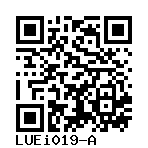iPS-L-8172-1
LUEi019-A
General
Cell Line |
|
| hPSCreg name | LUEi019-A |
| Cite as: | LUEi019-A (RRID:CVCL_A1GS) |
| Alternative name(s) |
iPS-L-8172-1
|
| Cell line type | Human induced pluripotent stem cell (hiPSC) |
| Similar lines |
LUMCi027-A (LUMC0153iPKP03) Donor's gene variants: PKP2 Donor diseases: arrhythmogenic right ventricular dysplasia 9 RCMGi011-A (P10L1) Donor diseases: Mucopolysaccharidosis Type IVB autosomal recessive nonsyndromic deafness 12 RCMGi011-B (P10L2) Donor diseases: Mucopolysaccharidosis Type IVB autosomal recessive nonsyndromic deafness 12 |
| Last update | 2nd October 2020 |
| User feedback | |
Provider |
|
| Generator | Institute of Neurogenetics (LUE) |
External Databases |
|
| BioSamples | SAMEA7513376 |
| Cellosaurus | CVCL_A1GS |
| Wikidata | Q102114485 |
General Information |
|
| Projects | |
| * Is the cell line readily obtainable for third parties? |
Yes Research use: allowed
Clinical use: not allowed
Commercial use: not allowed
|
Donor Information
General Donor Information |
|
| Sex | female |
Phenotype and Disease related information (Donor) |
|
| Diseases | A disease was diagnosed.
|
Donor Relations |
|
| Other cell lines of this donor | |
External Databases (Donor) |
|
| BioSamples | SAMEA7513377 |
Ethics
| Has informed consent been obtained from the donor of the embryo/tissue from which the pluripotent stem cells have been derived? | Yes |
| Was the consent voluntarily given? | Yes |
| Has the donor been informed that participation will not directly influence their personal treatment? | Yes |
| Can you provide us with a copy of the Donor Information Sheet provided to the donor? | Yes |
| Do you (Depositor/Provider) hold the original Donor Consent Form? | Yes |
| Please indicate whether the data associated with the donated material has been pseudonymised or anonymised. | anonymised |
| Does consent explicitly allow the derivation of pluripotent stem cells? | Yes |
| Does consent prevent CELLS DERIVED FROM THE DONATED BIOSAMPLE from being made available to researchers anywhere in the world? | No |
| How may genetic information associated with the cell line be accessed? | Controlled Access |
| Will the donor expect to receive financial benefit, beyond reasonable expenses, in return for donating the biosample? | No |
| Has a favourable opinion been obtained from a research ethics committee, or other ethics review panel, in relation to the Research Protocol including the consent provisions? | Yes |
| Name of accrediting authority involved? | University of Luebeck |
| Approval number | 05-030 |
| Has a favourable opinion been obtained from a research ethics committee, or other ethics review panel, in relation to the PROPOSED PROJECT, involving use of donated embryo/tissue or derived cells? | Yes |
| Name of accrediting authority involved? | University of Luebeck |
| Approval number | 05-030 |
| For generation of the cell line, who was the supplier of any recombined DNA vectors or commercial kits used? |
hIPSC Derivation
General |
|
| Source cell type | |
Reprogramming method |
|
| Vector type | Non-integrating |
| Vector | Sendai virus |
Vector free reprogramming |
|
Other |
|
| Derived under xeno-free conditions |
Unknown |
| Derived under GMP? |
Unknown |
| Available as clinical grade? |
Unknown |
Culture Conditions
| Medium |
mTeSR™ 1
|
Characterisation
Analysis of Undifferentiated Cells
Score:
| Marker | Present | Absent |
| mCpG | ||
| OCT4 |
Differentiation Potency
In vitro spontaneous differentiation
| Marker | Expressed |
| GATA4 |
Yes |
| SOX17 |
Yes |
In vitro spontaneous differentiation
| Marker | Expressed |
| MSX1 |
Yes |
| MYH6 |
Yes |
In vitro spontaneous differentiation
| Marker | Expressed |
| NCAM |
Yes |
| PAX6 |
Yes |
Genotyping
Karyotyping (Cell Line) |
|
| Has the cell line karyotype been analysed? |
Yes
No abnormalities detected
Karyotyping method:
Molecular karyotyping by SNP array
http:// |
Other Genotyping (Cell Line) |
|


Login to share your feedback, experiences or results with the research community.